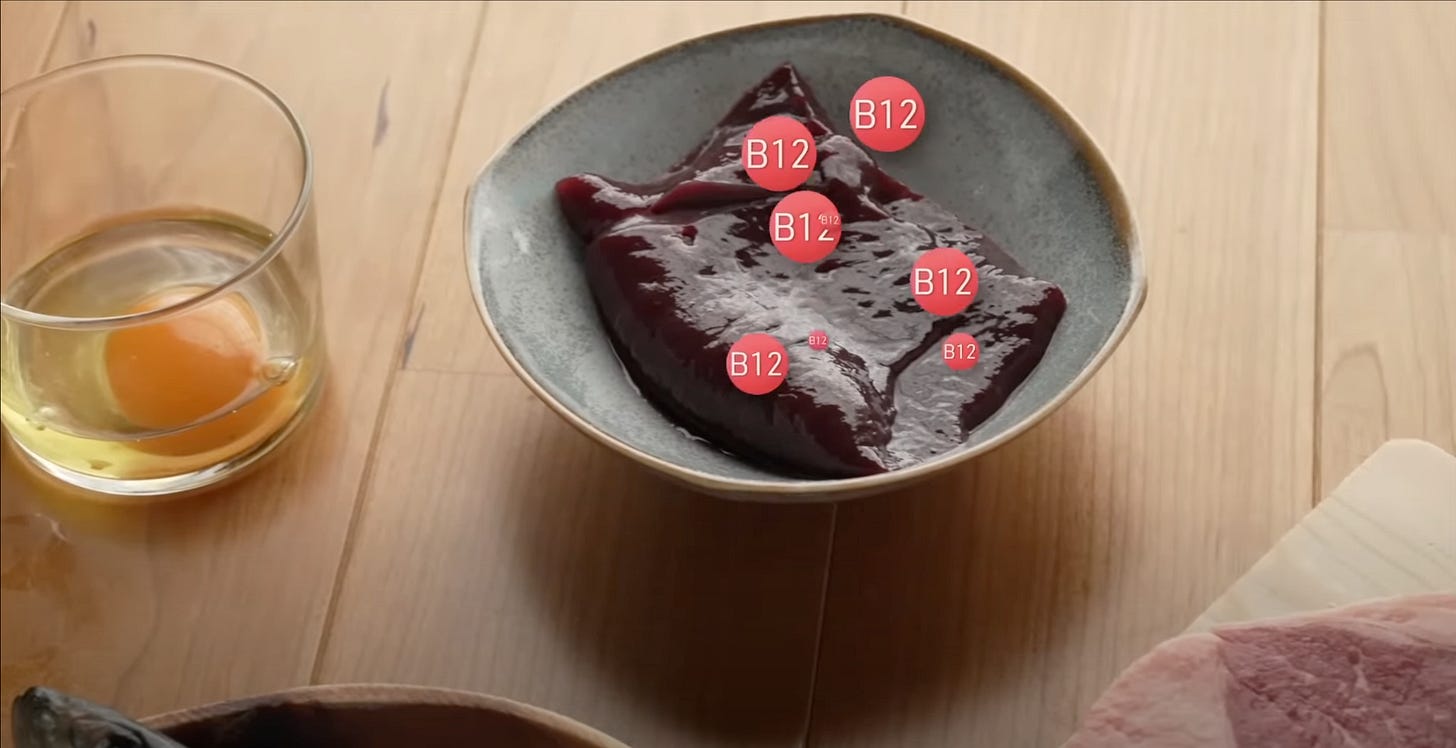Was I wrong about Vegans & B12?
My recent video "Vegan diets don't work" has stirred up some frustration
Recently, I posted a video titled Vegan diets don’t work. Here’s why
A couple people seemed to be very frustrated with the section on B12. This is an important topic as prolonged B12 deficiency can cause permanent neurological damage.
Let’s take a look at what I said, what the criticisms were, and whether or not what I’ve said still has merit or if that section of my video is just a heaping pile of B12-rich crap.
Study on Vegans having poor B12 status despite supplements
Here’s what I said: Most vegans know they need to supplement B12 which is very important for proper brain function. Yet, one study looking at B12 status in vegetarians and vegans found that 7% of vegetarians and 52% of vegans were not getting enough B12. (S) However, in another study with a more sensitive testing method - they found a whopping 77% of vegetarians and 92% of vegans had insufficient B12 whereas only 11% of omnivores did. (S)
The criticism:
・Why use two studies where most of the participants weren’t supplementing to suggest that B12 supplements might not “work exactly like animal foods do?”
It is true that there is more nuance to these papers.
First, when you look at the "more sensitive testing method" study, you’ll se it did in fact differentiate between vitamin users and non-users and a large proportion of the vegans were not using supplements. However of all the vegans that were using supplements, 88% of the vitamin using vegans were deficient in B12. 62% of the vitamin using vegetarians were deficient.
Second, while the British study that said 52% of vegans were deficient in B12, I failed to include some interesting points.
(1) If we were to go by the metric of depletion (118 to 150pmol/l), 71% of vegans would be vitamin B12 "depleted."
(2) Importantly, the study did in fact check whether people were supplementing. Only 19% of the vegans were supplementing.
(3) However, the study noted on 3 occasions that "there was little difference in serum vitamin B12 between supplement and non-supplement users"
So, these added details bolster my points that
(1) The B12 supplements don't seem to be working exactly like meat and that vegans may need to get their B12 tested if they’ve been on the diet long term.
(2) Vegans need to pay attention to the dose and type of their chosen supplement. Ironically, including these points about the above studies in the video would’ve made my argument even stronger.
I regret that these nuances didn’t make it into the final video. This wasn’t intentional - I read these two studies early in the research process but my notes on them weren't as organized as they needed to be.
B12 supplements don’t work like animal foods?
What I said: Perhaps these B12 supplements don’t work exactly like animal foods do. Also it can take years to deplete the body’s B12 store, so people can be lacking B12 for a while without realizing it.
The Criticism: There are other studies finding vegans supplementing B12 are not deficient. B12 supplements “work” just fine, just like animal foods.
I understand if it seems like this idea was based simply on that one study that I presented. Most of the logic/research leading up to the video doesn’t make it into the final video as the video needs to be (somewhat) watchable.
First off, a review paper titled Vitamin B12 among Vegetarians: Status, Assessment and Supplementation says that:
The use of supplements or fortified foods seems to prevent deficiencies, indicating that a well-planned plant-based diet has proven to be adequate and sustainable. However, despite the use of fortified foods, deficiency over a period of five years could occur, demonstrating a continuing insufficient intake or a possible decline in the absorptive capacity due to aging. In all likelihood, even when supplementation occurs, it is possible that concentrations sufficient to avoid the reduction of body stock in the liver, blood and kidney cannot be reached.
As we’ll see, there are differences between supplemental B12 and animal food B12. You’ll also understand why in the video I specifically said: “This isn’t to say it’s impossible to get enough B12 from supplements - perhaps some people simply need to take more or a different type.”
So what would be different from food derived B12 (animal foods) and supplemental B12? Consider these two points before we get into those differences:
(1) Based on a Systematic Review on Daily Vitamin B12 Losses, people lose about 1.4 to 5.1 micrograms of B12 a day.(S) Meaning we better be absorbing at least that much each day.
(2) The Vegan Society says: 'Take one B12 supplement daily providing at least 10 micrograms OR take a weekly B12 supplement providing at least 2000 micrograms.'
The RDA for B12 in adults is 2.4 micrograms/day(NIH.org) and this is probably too low as one study says that based on the data of several vitamin B12 status biomarkers studies, adults should be getting 4 micrograms of B12 a day. Unfortunately for those following The Vegan Society’s recommendation, one study says that if you’re using supplements for B12, the dose “should be about 100 times higher” than the RDA. This would be a 240microgram supplement. Compare that to The Vegan Society’s recommended 10micrograms. The reason for this is that the percentage of B12 absorbed rapidly reduces as you increase the supplement dose.(S)
If you take 1 microgram, you absorb about half that. If you take 10 micrograms as The Vegan Society recommends, you may not be getting enough B12 because you’ll only absorb 1.6 micrograms. Remember, as mentioned, our daily losses of B12 could be as high as 5.1 micrograms a day. Actually, you will get even less B12 from a 50microgram supplement as you’ll only absorb 3% - 1.5 micrograms. The advice to get 100x the RDA makes sense. 240micrograms isn’t listed in the table above, but absorbing 2% of a 500 micrograms supplement will get you over the RDA at 9.7 micrograms.
All of this is echoed in the paper Vitamin B12 Supplementation Adequacy in Australian Vegan Study Participants where they looked at a huge group of vegan women supplementing with B12. The study looked at vegan 1530 women. 1131 of them were supplementing. They found that when you take into account the absorption of B12 from supplements, “just over half of the participants had an intake from supplements equivalent to less than the RDI.”
“Total intake did not meet RDI equivalency based on estimated absorbed for 39% of the participants, compared with 26% when calculated as mean daily intake. … It is especially concerning that the total vitamin B12 intake of almost half of the pregnant and lactating women was estimated as being below the RDI when absorption of supplements was taken into account, given that foetal and infant deficiency can result in permanent neurological damage.”
In a 1994 study when vegans with low B12 swallowed a supplement with a whole 100micrograms of B12, their B12 only went up 12% after 6 weeks. (More on this in a bit)
Another study echoes the idea that the recommended B12 intake needs to be raised. It claims that "micronucleus formation in peripheral blood lymphocytes, an index of chromosome breakage and loss, is minimized at plasma Cbl (B12) levels above 300 pmol/l (410 pg/ml), requiring a Cbl intake of 7 micrograms/day. …Thus, the current RDI [Recommended Dietary Intake] for Cbl may be inadequate to ensure genomic stability."(S)
Again, if someone were to base their plant-based diet on the Vegan Society’s advice, they could be falling way short of the amount of B12 that they actually need. I’m not defending the “average” omnivore’s diet here either as I imagine it’s probably plentiful in crappy processed food, refined grains and seed oils, contains little to no nutrient dense organ meats like liver, and probably has a lot less nutrient dense red meat than they could stand to benefit from.
Further, B12 specifically from multivitamins may be even worse. A 1994 paper questioned whether you could even absorb the B12 you get in the form of a multivitamin, saying: “Whether or not vitamin B12 encased in a multivitamin pill can be absorbed, remains to be determined. It may bypass combination with the ‘R’ factor in the mouth or stomach.”
Jack Norris of VeganHealth.Org wrote that:
There are anecdotal reports of vegans becoming B12-deficient after relying on multivitamins or prenatal supplements without an additional B12-only supplement. While disconcerting, these reports could have mitigating factors and the prenatal supplements likely didn’t contain enough B12 to meet our minimum recommendations.
The vegan nutritionist, whose concerns about multivitamins caused me to write this article, told me that she and several of her clients had become deficient while taking a daily vegan multivitamin containing 100 µg of B12.
(For transparency, Norris appeared to remain somewhat optimistic of multivitamins by the end of the article… despite him saying I’m sympathetic to the idea that it could be dangerous for vegan health professionals, and the greater vegan community, to promote the idea that for B12 vegans can “just take a multivitamin.” More on this later.)
There is a handful of vegans posting videos online of themselves self-administering B12 shots. Dr. Harpal Bains claims in an article that “If you’re taking oral vitamins you may want to consider a B12 injection, particularly if you’re experiencing any of the symptoms of a deficiency.” This is convenient advice for her considering her clinic offers B12 shots … but it is true that the absorption of a B12 shot is way better than a B12 supplement. As shown in the able above, only 1.3% of a 1000 microgram oral supplement is absorbed, but 15% of a 1000 microgram injection is absorbed.
B12 absorption from animal food
Looking at the above chart, it looks like the B12 from food is generally better absorbed. Whereas you can absorb only 16% of a 10 microgram supplement, you can absorb a whole 42% of the 9.2 micrograms in Fish. Based on the table from before, we should expect the absorption of a 5 microgram supplement to be higher than 16% but a good bit lower than 56%, yet 53% of the 5.11 micrograms from mutton can be absorbed. Liver has a ton of B12 and indeed the absorption is lower, but healthy subjects absorbed anywhere from 5.1-19.5% of the 38 micrograms in it whereas you can only absorb 3% of a 50 microgram supplement. Further, “results from some observational studies suggest that absorption from dairy products, especially milk, may be higher than that from other dietary sources.”(S)
Approximately 1% of large doses of crystalline vitamin B12 found in some supplements (1,000µg), are absorbed through a mass action process, even in the absence of IF , indicating crystalline vitamin B12 in high doses and food vitamin B12 are absorbed by different mechanisms.(S)
Considering B12 absorption is significantly better from food than from supplements, indeed, “these B12 supplements don’t work exactly like animal foods do.”
There are several things you would have to worry about with getting B12 a supplement, but aren’t issues when you get it from food. Noting these differences would help vegans get the most out of their supplements.
(1) The presence of food is recognized as being necessary to stimulate the normal vitamin B-12 absorptive mechanisms.(S) This is probably because, as this study points out, “the gastric stimulation that a meal induces may enhance vitamin B12 absorption.” (Note: For very high supplemental doses, because it is absorbed through a different mechanism, more is absorbed on an empty stomach)
(2) The body’s B12 absorption capacity recovers to baseline within 4-6 hours(S), but where we eat food multiple times a day, people usually only supplement once a day. Perhaps vegans would benefit from taking B12 twice a day. The earlier Australian study on vegan women found that of the 1131 of them taking supplements, only 1.5% of them took supplements twice daily.
In people who can absorb vitamin B12, small amounts (in line with the recommended dietary intake) and frequent (daily) doses appear to be more effective than infrequent large doses, including intramuscular injections. (S)
(3) B12 supplements are photosensitive, so keep them in a dark place to prevent them from degrading. (S,S2,S3)
(4) B12 supplements lose their potency over time.(S) Maybe it hasn’t been long since you bought your B12 supplement, but when was it manufactured?
(5) Certain supplements may be more effective if you chew them. In that earlier mentioned 1994 study in the Journal of Nutritional Medicine, vegetarians deficient in vitamin B12 who took a 100 microgram supplement were only able to raise their serum B12 by 12%. However, the people who chewed the tablet were able to increase their serum B12 by 150%.
(6) Getting B12 in the form of a multivitamin may not be the best choice as B12 can degrade in the presence of Vitamin C. Victor Herbert has warned that that various ingredients in multivitamins, especially vitamin C, could damage B12 (S, S2). Presence and formation of cobalamin analogues in multivitamin-mineral pills incubated the contents of three multivitamin preparations and incubated them at 37°C (body temperature) for 2 hours and found that 20 to 90% of the B12 had degraded. There is room to wonder whether this happens when a human is digesting the vitamin. Herbert et al reported in Multivitamin/mineral food supplements containing vitamin B12 may also contain analogues of vitamin B12 that inactive B12 analogs were found in all of 15 commercial multivitamins they tested, suggesting B12 degradation.
Here’s an excerpt from Low Serum Vitamin B-12 Concentrations Are Prevalent in a Cohort of Pregnant Canadian Women
“Deficient and marginal serum vitamin B-12 concentrations are prevalent in Canadian pregnant women with the use of traditional cutoffs, despite supplement use. Given the growing interest among women to adhere to a vegetarian diet that may be lower in vitamin B-12, and vitamin B-12's importance in pregnancy, the functional ramifications of these observations need to be elucidated.”
Sure the omnivore women supplementing had better B12 status than those omnivore women not supplementing, but veganism would be an added challenge to the B12 status of pregnant women. Given the points discussed above, the average omnivore (pregnant or not) may benefit from increase their consumption of nutrient dense and B12-rich ruminant meat.
Back in 1946 we seemed to understand the value of meat during pregnancy.
"The results indicate that the recommendation to normal pregnant women to increase their protein intake by eating a generous serving of meat daily in addition to their self-chosen diets would be effective in increasing hemoglobin and red cell concentration, avoiding edema and promoting lactation."
One study in the American Journal of Clinical Nutrition found while that supplemental vitamin B-12 intake can increase serum B12, they found no “relation between supplemental vitamin B-12 consumption and any of the metabolites assessed”, referring to more pertinent markers of B12 deficiency like Methylmalonic acid.
Authors published in the Journal of Clinical Nutrition remarked that “Sharabi and colleagues did not document a decrease in HCy and MMA (elevated levels indicate poor B12 status) following 8 weeks of intervention with 500 micrograms/day of sublingual and oral B12 administration in subjects with a cobalamin deficiency.”
Now take a look at this study in vegetarian women with a mean B12 serum of 125pmol/L (deficient). 500 micrograms of B12 a day did correct their deficiency and get their B12 to 215pmol/L after only 2 weeks. Interestingly, after 6 weeks it was back down to 198pmol/L suggesting a possible tapering off effect. If I were to hazard a comparison between groups in two different studies, it’s interesting to note that the omnivores in the earlier mentioned British study were estimated to be getting only 8.76micrograms/day and they had sufficient B12 at 281pmol/L. With a mere 8.76micrograms/day, the omnivores were at 281pmol/L of B12, but the vegetarian women taking a 500microgram supplement every day only got up to 198pmol/L after 6 weeks.
Does Fiber make you lose more and absorb less B12?
I’ve already discussed the potential of copious amounts of fiber (and other plant compounds) hampering vegans’ digestive faculties and their ability to process and absorb B12, but here’s something I hadn’t shared yet.
・An old study found that increasing the fiber intake in rats “enhanced the depletion of body stores of vitamin B12. …The authors suggest that both fibers interfere with the recovery of biliary vitamin B12 by binding to a residue that is little metabolized until it passes the ileum reabsorption site.”(S)
・11 years later, another study found that the soluble fiber pectin “significantly inhibited vitamin B12 absorption when compared with FF [Fiber Free] diet.” The more fiber, the less B12 was absorbed.
・A study on East Indian Immigrants living in Canada also surmised that the low B12 status of the people had something to do with the fiber in the diet, suggesting “that the high dietary fiber levels of Punjabi diets may increase fecal excretion of vitamin B-12.
Supplements vs supplements
Supplements work different from animal foods, but some supplements work different from other supplements. Sublingual B12 might be better than oral B12.
This study testing sublingual supplements on vegans and vegetarians with a marginal B12 deficiency notes that “sublingual vitamin B12 is often promoted for better absorption” and they observed great results from giving people 50micrograms/day of B12 sublingually. It’s interesting to note that:
・The vegans/vegetarians taking that 50 microgram supplement every day for 3 months were still not able to get their serum B12 as high as the omnivores from the British study consuming 8.76micrograms/day from food. The 50 microgram daily sublingual supplement group got the vegans and vegetarians’ B12 to slightly over 250 - still under the British omnivores’ B12 of 281. (Those supplementing 2000 micrograms per week did get their serum B12 higher - around 315.)
*Other markers of B12 status of the vegans/vegetarians in this study did end up being much better than that of the British omnivores.
Yes you will find studies where vegans supplementing B12 have great markers of B12 status. As mentioned in the video, I’m not saying it’s impossible to get enough B12 from supplements. However, just grabbing any supplement that has 10 micrograms of B12 like The Vegan Society recommends is not be the best idea for vegans, especially considering the RDA may be set too low.
I think the enthusiasm with which the vegan diet is presented as super easy to succeed on can be harmful. Vegans, especially women need to be warned about these intricacies about the way B12 supplements work to make sure they choose a supplement that is actually effective. It can take years for the liver stores of B12 to deplete, so a deficiency can sneak up on people who had assumed they were getting by just fine on a supplement with poor effectiveness.
Hidden B12 deficiencies?
Unfortunately getting a blood test might not even reveal the full picture on your B12 status. According to The Many Faces of Cobalamin (Vitamin B12) Deficiency
“There is a tendency among physicians to consider a serum vitamin B12 level higher than 140 pmol/L as normal, but many symptomatic patients may present with such levels, for instance because of taking oral vitamin supplementation. This does not mean that their tissue vitamin B12 levels are normal as well. …Methylmalonic acid and homocysteine are not very sensitive biomarkers, but there is currently no good alternative…”
Another 2010 study says “sometimes, neurological symptoms are the only clinical manifestation of vitamin B12 deficiency.”
Even Michael Greger, author of various pro-vegan books acknowledges that there can be cases where people have normal blood markers for B12 status yet have symptoms indicating severe B12 deficiency.
So, at the end of the day
As already mentioned in the video:
・Yes, B12 from animal food is different from B12 in supplements
・Yes, you should be able to get enough B12 from supplements if you take doses that are far higher than what food would naturally provide
Vegans should be thoroughly educated about B12 supplements before starting their diet. Because of the permanent neurological damage that untreated B12 deficiency can cause in children and adults, this issue should be taken more seriously. Luckily, nowadays most supplements on the US market seem to be dosed quite high. The best selling B12 supplement on Japanese Amazon is only 100mcg so it may vary country to country. Even vegan rockstars like Neal Barnard try their best to make it sound like no big deal at all and end up recommending too little B12. “How much do you need? The amount you need is like really tiny. …Don’t worry, just choose any common brand [of B12 supplement] that is the smallest you can get.”


























Love all the extra study references. Great deep dive, thanks!
Make a video about the influence of vitamins and minerals on each other.
F.e. High blood glucose causes Mg deficiencies because Mg is needed to return to homeostasis